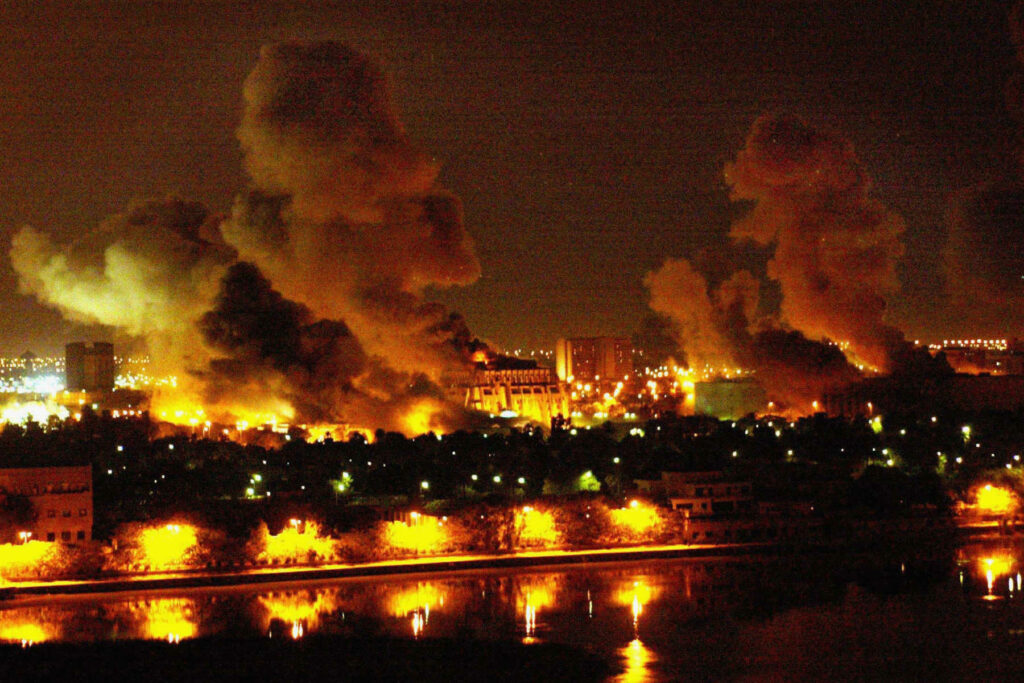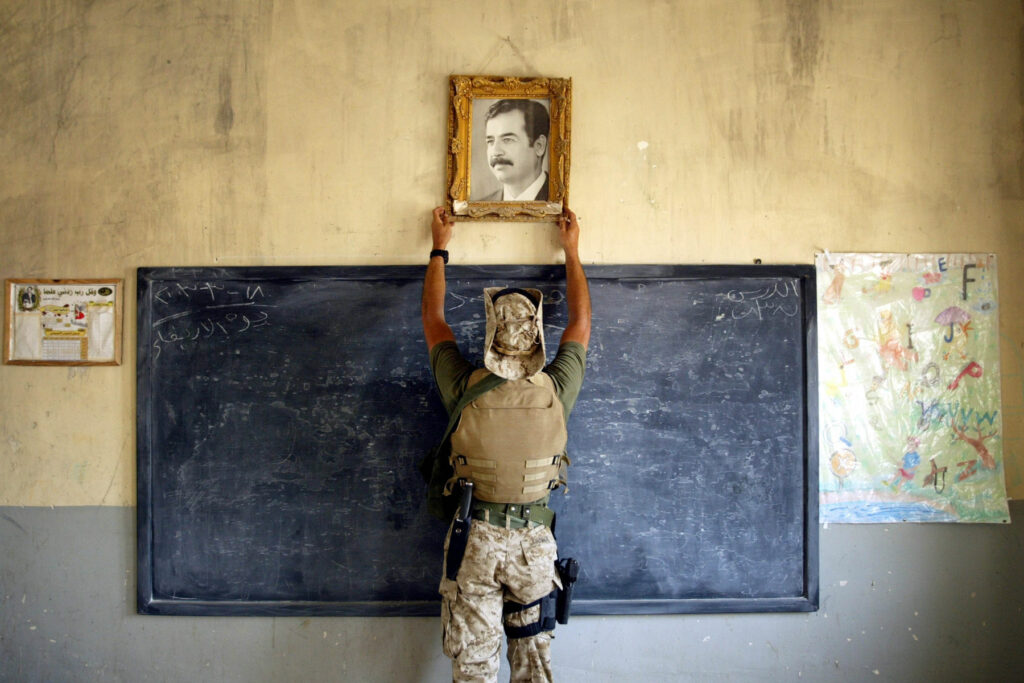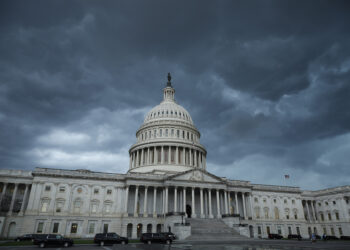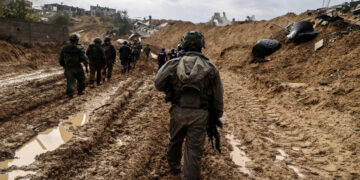Omid Memarian, a journalist, analyst and recipient of Human Rights Watch's Human Rights Defender Award, is the Director of Communications at DAWN.
"The question is, what did not go wrong?" George Packer says of the U.S. invasion and occupation of Iraq that began 20 years ago this week. "Because just about everything went wrong."
Packer, a longtime staff writer at The New Yorker who joined The Atlantic in 2018, reported firsthand on a war he initially supported. That was the central narrative of his widely praised 2005 book, The Assassins' Gate: America in Iraq, detailing "the nearly interminable buildup to war," the disastrous American occupation that followed—and the many decisions and missteps between them by the war's architects. It won the Overseas Press Club's Cornelius Ryan Award for best nonfiction book on international affairs.
One line in The Assassins' Gate still stands out, as Packer himself acknowledged not long after it was published: "The Iraq War was always winnable; it still is," he wrote. In an interview later in 2005, though, Packer admitted, "By now, I'm quite grim, and I would not have written that line in the present tense."
On the ten-year anniversary of the invasion of Iraq, he wrote unequivocally that "the war was a disaster for Iraq and the U.S. alike. It was conceived in deceit and born in hubris, a historic folly that took the American eye off Al Qaeda and the Taliban, while shattering Iraq into a million bloody pieces."
Packer is the author of nine other books, including The Unwinding: An Inner History of the New America, which won the 2013 National Book Award for nonfiction; Our Man: Richard Holbrooke and the End of the American Century, which won the 2019 Hitchens Prize and the Los Angeles Times Book Prize and was a finalist for the Pulitzer Prize; and, most recently, Last Best Hope: America in Crisis and Renewal. He writes regularly about U.S. foreign policy for The Atlantic, including a devastating, impeccably reported account last year of the U.S. withdrawal from Afghanistan and the Biden administration's failure to plan for the evacuation of thousands of Afghan allies, titled "The Betrayal."
He spoke to Democracy in Exile days after the 20th anniversary of the U.S. invasion of Iraq. As he says, "the Iraq War continues to haunt us and to offer lessons for the future."
The following transcript has been edited lightly for clarity and length.
The occupation was seen as illegitimate by the majority of Iraqis and by the majority of the world, and increasingly by a majority of Americans. Without legitimacy, the rest of it is built on a shaky foundation.
- George Packer
Why is it so important to speak about the Iraq War 20 years after the U.S. invasion?
It's impossible not to talk about it because, first of all, it's one of the most important and ultimately disastrous foreign policy decisions in United States history. Also, because it's easy for Americans to forget and move on, and especially when it's a painful memory like the Iraq War. It's comfortable not to talk about it, and I think many of us go long periods of time without thinking about it, which is a luxury that Iraqis and American veterans of the war don't have. But we owe it to them and to ourselves and to history to keep talking and thinking about it, because it's complicated and our understanding of it, I think, changes as history moves on. So it's not something we can leave in the past.
I remember in early 2003, Iraqi opposition figures close to the Bush administration traveled to Tehran and signaled that the war was inevitable. But the perception in Tehran was that it wasn't going to happen and, if it did, it would be another Vietnam War for the U.S. What went wrong?
Well, the question is, what did not go wrong? Because just about everything went wrong. From the moment of the invasion, the assurances that there were weapons of mass destruction that justified the war, which turned out to be false—whether it was a lie or a mistake or, what I think, something closer to self-delusion, groupthink, selective reading of intelligence, manipulation of intelligence. That ended up taking away the whole justification for the war and its air of legitimacy, if it ever had any.
So the wrong decisions began way before the first troops set foot in Basra. The lack of planning for after the Saddam regime was an ideological lack of planning. It wasn't just a bureaucratic failure; it was a decision not to plan because the Bush administration didn't believe in nation-building and didn't believe in committing large numbers of troops. It was the small footprint that Rumsfeld wanted and didn't want to be bothered with it, didn't want to have that burden. The messy task of rebuilding Iraq and trying to bring about some kind of legitimate government was just not something that interested George Bush, Dick Cheney, Donald Rumsfeld, Paul Wolfowitz—the people at the top of government.
The mistakes then cascade from those early failures. The mistake of disbanding the Iraqi army, decapitating the bureaucracy of Baathists, of allowing the looting in the first weeks, to tell Iraqis that America was incapable or unwilling to impose order. Especially middle-class Iraqis and, you could say, the urban, secular, educated Iraqis who were going to be the natural partners of any postwar effort, immediately lost confidence in us and in their own ability to survive the chaos, because those who survived were the people with guns. It became a militia man's delight to carve up Baghdad and Iraq with checkpoints and guns and car bombs and firefights. All of that was made pretty much inevitable at the very beginning by the lack of enough troops and the lack of a strategy of bringing order and governance to that country.
From the very beginning, we were in a sandpit. The faster we tried to dig our way out, the deeper the pit seemed to get. Obviously there were periods, glimpses of daylight: The election of 2005, which I was there for, was a moment when many Iraqis, not so much in the Sunni community, were genuinely overjoyed to be able to vote for the first time, and they did at great risk to themselves.
The surge of 2007 and the Sunni awakening, which finally began to reduce the level of violence and to put an end to, at least for a while to, the rule of the terrorists. Those were moments of hope, and people in Iraq clung to them. But they were really just moments, because the general trajectory from early April [2003] onward was downhill. And it never took a different course.
Even if the U.S. deployed a million troops in Iraq and had intentions of nation-building, would they have been equipped enough to go after this mission?
No. I think, in retrospect, what I have concluded is we were never capable of doing it—we did not have the knowledge, we did not have the ability, we did not have the people, we did not have the policies, and we did not have the legitimacy. The occupation was seen as illegitimate by the majority of Iraqis and by the majority of the world, and increasingly by a majority of Americans. Without legitimacy, the rest of it is built on a shaky foundation.

Are there overarching similarities or patterns between America's major wars, from Iraq and Afghanistan back to the Korean War in the 1950s?
I think that the recurring pattern, in let's say the second half of the 20th century and the 21st century, is that we know how to fight wars in the sense that we know how to bring masses of troops and armor and ships and planes to inflict violence and destruction on an enemy, enough to overcome that enemy. We've always been able to do that, with the exception of Vietnam, where we were fighting a revolution and a war of nationalism. I don't see Iraq as being comparable to Vietnam. I think Afghanistan is much closer to Vietnam. But what we've never been able to do is understand the political nature of these wars and find a way to move from the kinetic phase to the politics of war, and the politics of trying to achieve peace and governance. We've always had a sort of oversimplified view that the way you win a war is by overwhelming the enemy and overwhelming the enemy's will to fight. But we don't understand the politics of which war is another means, and so we keep running into the same problem of not being able to finish it, and getting deeper and deeper into a quagmire and finally throwing up our hands in despair and deciding to leave because it's not working.
The U.S. military doctrine during the Korean War was that through huge air raids and blanket bombardments, they could bring the North Korean leaders to their knees and change the behavior of the regime in Pyongyang. The doctrine of the Iraq War was that after an extensive period of sanctions, a military attack would bring down a secular, totalitarian regime. Do you think this mindset is still alive in U.S. foreign policy, the thinking that these types of actions can change the behavior of adversaries around the world?
So many countries have had to learn the hard way that air power and air bombardment do not break the morale of an enemy people. The Nazis had to learn that when they thought they could bring Britain to its knees in 1940. We had to learn it in Korea and again in Vietnam. I think Russia's learning it right now in Ukraine, where they thought that a winter of destroying Ukrainian infrastructure, putting them in the cold and the dark, would break their morale, and it's had the opposite effect.
By now, it should be an easy lesson to learn. I think the more thoughtful American policymakers do not imagine that sheer firepower, "shock and awe" as Rumsfeld called it in Iraq, is how you win a war. I think the thoughtful ones have learned that and have become skeptical of military claims that if we just have more, if you just give us more time, more troops, more firepower, more money, we can do this.
Because that was what we heard in Afghanistan year after year. Finally, Joe Biden decided that he'd heard enough and it wasn't worth it, it wasn't worth whatever the cost. He's a policymaker, and he seems to have learned something from the failures in Afghanistan and Iraq. Although it's complicated in Afghanistan, because I think the way he executed that policy was tragic, there's always going to be a set of Washington foreign policy types who simply believe that we can hammer them into submission. I don't think that's a serious position among most people in power right now. I think they've learned more than that.
In an interview with the San Francisco Chronicle in 2005 you said, "What liberals need to do now is argue very strongly for the U.S. to remain engaged in a responsible internationalist way around the world."
I still believe that.
Around that same time, people started to be skeptical about the war in Iraq and asked for the U.S. to pull back. Do you think liberals have moved toward "a responsible internationalist way around the world" since then?
I think the left in this country is divided now. I think all the way up until the exit from Afghanistan, the Democratic Party had generally become an anti-intervention party through hard knocks, through feeling like suckers because of their support for the Iraq War, and feeling disillusioned by the failure in Afghanistan. But within six months, Russia invaded Ukraine, and suddenly an independent country, a democratic country, was not going to survive without American support—and that changed many people's views who had really a fairly dogmatic position against any American involvement in war overseas, unless it was a war of our own survival. Others have clung to that position and made all sorts of arguments for why Ukraine didn't really matter that much.
So it's a bit of a whiplash effect in the last year and a half or so, where restraint seemed king, both on the left and the right after Afghanistan. There was a lot of, "I told you so," and a lot of, "Have you learned your lesson?" And then suddenly the lesson seemed to be a different one, and people had to change and think anew, as Lincoln said. And that's the way it should be, because, as Leslie Gelb, a great foreign policy thinker once said to me, "foreign policy makes no sense." As soon as you've come up with a doctrine or a philosophy with an "-ism" attached to it, something happens somewhere in the world that makes nonsense of it. You have to be able to adjust and change your thinking and not be—not treat foreign policy as a religion or a political orthodoxy. It's a mess. It's just a mess, and every president learns that the hard way. Just when they think they've got a new frontier, or the Bush doctrine, or the Obama doctrine, or even the Biden doctrine after Afghanistan, something somewhere in the world takes a match and burns it down.
We have cost ourselves a great deal in credibility, in legitimacy, influence and even just power because we are a backsliding democracy ourselves.
- George Packer
In your January 2022 article in The Atlantic on the U.S. withdrawal from Afghanistan, "The Betrayal," you wrote that "America's chaotic withdrawal from Afghanistan added moral injury to military failure." How might such failures impact the U.S. in the short and long term?
I think that what I've begun to see—I don't know if you read Trita Parsi's op-ed today in The New York Times, you should read it. I don't agree with it, but I think it expresses one view that is out there now that's a very potent one. That view is that we live in a multipolar world. No country can enforce the rules. No country can lead. Every country has its own interests. Any wise power or superpower will acknowledge that and essentially stay out when it has no direct interest and will admit the interest of other countries in their own regions, and will look more for opportunities to make deals, negotiate, trade and bring down barriers, rather than divide the world up into long, tendentious, moralistic lines between "us" and "them." So that's one view, and it's a very powerful view. Certainly we're moving into a period, into an age, where there is no single great power as there was for 20, say, 25 years after the end of the Cold War.
The other view is while we're moving toward a more dispersed and diffuse geopolitics, we're also moving into a period of anti-democratic politics, of backsliding in democracies and of hardening of authoritarian regimes. And not only hardening internally, but aggressive behavior externally. Ukraine is the obvious example, but so is China's behavior in the South China Sea and in the region, so is Iran's behavior in the Middle East involved in three or four wars. Et cetera, et cetera. So one answer to why can't we embrace multipolarity is that, well, in a multipolar world, there will be many hegemons and they will be behaving badly, each in their own region. It's not as though if we accept multipolarity, we are also embracing a more stable and peaceful world. Recent events suggest that the opposite is true, and that view says, well, what should the United States do?
The United States should look to its allies and its partners, strengthen those relationships, and see that it's the democratic countries that are the reliable ones that are willing to play by the rules, that are unwilling to see countries gobbled up by powerful neighbors, and that are even more reliable suppliers of essential goods. Supply chains now look like they're not something we can simply sustain, regardless of who's at the other end of it. It seems to matter what the political system is at the other end of it. Pandemics—it seems to matter whether the country where it begins is a totalitarian dictatorship or democracy. The world would be a very different place if the coronavirus had begun in Belgium rather than in China.
To me, those are the two competing visions of the decade we're in right now. I'm not going to tell your readers what to think, but, for me, whenever I find myself tied in a knot or running up against some kind of difficult decision, I realize it's because those two systems are, in some ways, fundamentally at odds. And it's very hard to dismiss entirely one or the other, because both of them have some truth to them.
Within that framework, the U.S. has been very much involved in supporting Ukraine in the unjust war waged by Russia. How do you characterize this war? How can the Biden administration make the case for supporting Ukraine unconditionally?
I think the case to be made is that, first of all, it's a complete, naked violation of the U.N. Charter and of essentially the norm of behavior for countries in the postwar period. We ourselves have violated the U.N. Charter, and that's an obvious rejoinder. So that's another way in which the Iraq War continues to haunt us and to offer lessons for the future.
But to me, that's just a whataboutism for people who don't want to have to answer the question about Ukraine. To me, Ukraine is a vital interest because it's in Europe, because it's a democracy, and because Russia is a truly threatening power with the closest thing to a kind of '30's-style totalitarian dictatorship that we've seen in Europe since the 1930s. Saddam Hussein had many of the same qualities in the Middle East, and that was the justification for people like Kanan Makiya to go to war. So, to me, Ukraine is not a hard case. There are people like Trita Parsi who think that we put way too much emphasis on it, and we're not willing to look for ways to get out, to find peace, to bring some stability. To me, they're all ways in which Russia wins, because Russia has now taken a giant chunk of Ukraine and will probably take more once it is able to regroup and rearm. It's an ugly and tragic thing that's been done to Ukraine, and by extension to us, by Russia. But one should never for a second take one's eye off the fact that this is Russia's war, that every consequence of it—whether it's high prices of fertilizer, energy, food, or depleting Western stocks of arms—is on Russia. It's not on us.

China is now pretending to be that kind of peace-loving multipolar power that we're supposed to be, and we seem not to be. But in fact, what China's doing is having it both ways, trying to keep its reputation as a member of the international order intact, while supporting Russia. People say, "Well, look, you've done a terrible job of persuading the Global South to support Ukraine." True, true. But maybe the Global South was never persuadable because they are pursuing what they see as their own interests. If they don't care about Ukraine, that is certainly their business. But the contrary view is maybe the West shouldn't care about them. I mean, if that's the way the world is, then why should we care about India unless it's in some way directly tied to our interests. Whereas people seem to want to have it both ways, where India or Brazil, or South Africa or Indonesia, can be indifferent to the fact that Russia is trying to destroy a neighboring country but we should do what is also in the interest of those countries. That to me is hypocrisy and doesn't hold up.
Russia also has more leverage over these countries and probably makes it more costly for them to take side with the U.S. in this case.
For sure. Russia's powerful, but Russia's also hollow. And I fear—I both hope and fear—that Russia is in some ways headed for a kind of caving-in because it is hollow. It has no economy. It has a Potemkin army that can't beat a country a tenth its size. It has a leader who rules by bribery and by intimidation, and it has lost its intelligentsia—they've left the country—and it's under sanctions that are going to eventually squeeze its potential for any kind of economic success, if they haven't already done so. Russia does not have a good future, and I think Putin probably knows that, which is why he has distracted his population with this evil war.
In your last book, Last Best Hope: America in Crisis and Renewal, you write about divides, a shaken democracy, and overall a grim picture of the United States. How could the state of American democracy embolden U.S. adversaries? How could America's domestic crises reshape U.S. foreign policy or the world order at large, if there are any connections at all?
That's a big question but the simple answer is there is most certainly a connection.
We have cost ourselves a great deal in credibility, in legitimacy, influence and even just power because we are a backsliding democracy ourselves. And we had the worst president in our history a few years ago and may have him again, and his party is a bankrupt party with no positive ideas for the country, but only a desire for power and a willingness to see the democratic institutions torched in the pursuit of power.
All of that is just a drastic, downward slide that encourages strongmen around the world to think that, not only do they really not have to worry about our rallying world opinion, but they might even have us on their side. Trump's affections went to the Putins and the Erdogans and the Kim Jong-uns, and his contempt went to the democratic leaders, Justin Trudeau and Emmanuel Macron and Angela Merkel. That signaled a complete change in our posture in the world, and I think the rest of the world knows that it could easily return. They don't trust us. So, we're badly, badly wounded. We're in this terrible position, Omid, where we're suffering inwardly, we are at war with ourselves, and yet no one else seems able to play the role that we have played in, perhaps hypocritically and perhaps badly, trying to enforce some kind of decent norms in the world and trying to, in this case, keep Ukraine alive. Without us, Europe wouldn't be able to do it. I don't know if we're indispensable, but we're important and we're also badly hurt. It's a dangerous situation at the moment.
Do you think Iraqis deserve justice through reparations?
I think that's not going to happen and probably shouldn't happen, because reparations are usually paid by countries that lose wars. We lost the war in Iraq in one sense, but we weren't defeated in Iraq, the Iraqi Army did not defeat the U.S. Army. In a way, it would be a kind of lie about the effect of that war in Iraq because the effect has been destruction and death, but it has also been a new Iraq—corrupt, sectarian, violent—but not the Iraq of Saddam Hussein. That's gone. I'm not sure that Iraq could have been destroyed by other means, it might have ended up with a kind of Syria-like civil war, which would've been a terrible outcome for Iraq as well. This is not a justification for the war, but simply a recognition that Iraq is now a different country from the one we invaded in 2003.
The one thing it still has that it did not have in 2003 is, in addition to elections and a pretty free press for the region, and no longer mukhabarat torture centers, and no longer the genocide of the Kurds—it also has some hope. It's a pretty dim hope, and I know Iraqis are extremely jaded right now and hostile toward their own government, but they do take to the streets, they do protest, and there is still some hope. So, for all those reasons, as much as we owe Iraq, I don't think we owe them reparations.





































